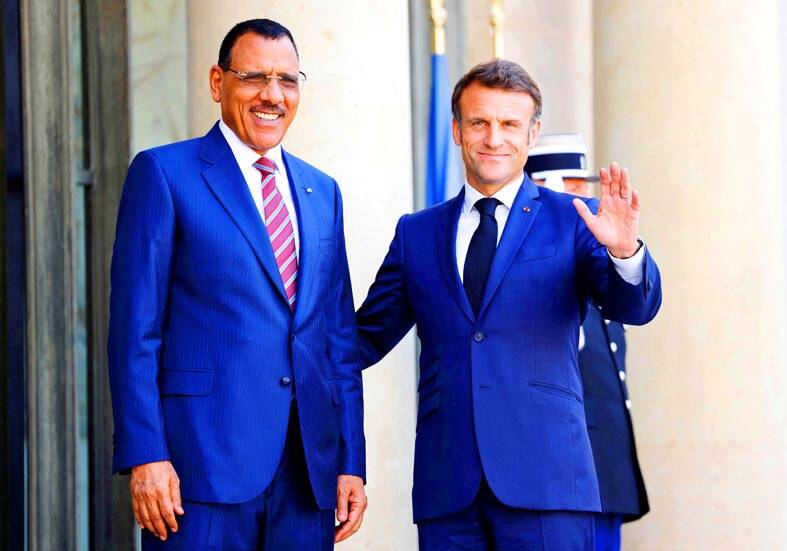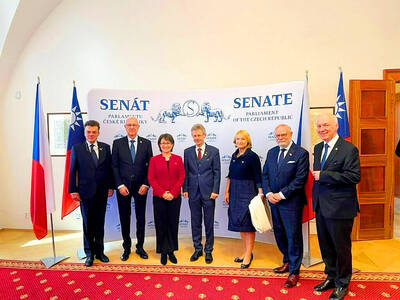Taiwan yesterday hailed France’s pledge to safeguard freedom of navigation in the Taiwan Strait a day after French President Emmanuel Macron signed into law the nation’s largest defense budget increase in more than 50 years.
The French Parliament on July 12 and 13 passed a 413 billion euros (US$453 billion) defense budget for the next seven years, which would push France’s military spending to more than 2 percent of GDP by 2025.
The budget bill — which was spurred by Russia’s invasion of Ukraine and China’s aggressive stance in Asia — said that France is an Indo-Pacific power, and has an obligation to defend freedom of navigation in the Taiwan Strait and the South China Sea.

Photo: AFP
As the only EU member with territories in the Indo-Pacific, France has a duty to uphold the rights of all nations to freely use the seas in the region, French Senator Olivier Cadic, one of the bill sponsors, said during deliberations.
Beijing’s provocative actions — including its efforts to seize international seas as its own, its harassment of legal fishing operations, construction of military bases and incursions into other nations’ sovereign waters — are to blame for the surge in regional tensions in the past few years, Cadic said.
China not only turned a deaf ear to the rulings of international courts with regard to its claims in the South China Sea, but also claims the Taiwan Strait, which poses a direct threat to global trade and maritime transportation, he said.
Beijing’s predatory acts and ever-growing military power means that a move by China to invade Taiwan would trigger a significant crisis, comparable to the Russa-Ukraine war, Cadic said, urging France to contribute to protecting freedom of navigation at sea.
In Taipei, the Ministry of Foreign Affairs said that Paris has significant influence over the Indo-Pacific region, and reiterated the importance of preserving peace and stability in the Taiwan Strait at this year’s G7 summit and other multilateral international events.
The French government’s defense budget indicates a recognition that protecting peace in the Taiwan Strait is aligned with its strategic national interests, and is essential to a free, open and prosperous Indo-Pacific region, the ministry said.
Taiwan would continue to work with France and other like-minded countries to defend the rules-based international order, it said.
Separately, Democratic Progressive Party (DPP) Legislator Wang Ting-yu (王定宇) said the defense budget’s reference to security in the Strait was a first in French law and was a declaration of intent.
The alliance of democracies has reached a consensus that it should maintain peace and stability in the Taiwan Strait, as regional unrest would have global repercussions to the shared interests of its members, Wang said.
DPP Legislator Tsai Shih-ying (蔡適應) thanked the French parliament for passing the bill, adding that a military crisis between Taiwan and China would have unbearable consequences for the world.

FREEDOM OF NAVIGATION: The UK would continue to reinforce ties with Taiwan ‘in a wide range of areas’ as a part of a ‘strong unofficial relationship,’ a paper said The UK plans to conduct more freedom of navigation operations in the Taiwan Strait and the South China Sea, British Secretary of State for Foreign, Commonwealth and Development Affairs David Lammy told the British House of Commons on Tuesday. British Member of Parliament Desmond Swayne said that the Royal Navy’s HMS Spey had passed through the Taiwan Strait “in pursuit of vital international freedom of navigation in the South China Sea.” Swayne asked Lammy whether he agreed that it was “proper and lawful” to do so, and if the UK would continue to carry out similar operations. Lammy replied “yes” to both questions. The

Two US House of Representatives committees yesterday condemned China’s attempt to orchestrate a crash involving Vice President Hsiao Bi-khim’s (蕭美琴) car when she visited the Czech Republic last year as vice president-elect. Czech local media in March last year reported that a Chinese diplomat had run a red light while following Hsiao’s car from the airport, and Czech intelligence last week told local media that Chinese diplomats and agents had also planned to stage a demonstrative car collision. Hsiao on Saturday shared a Reuters news report on the incident through her account on social media platform X and wrote: “I

SHIFT PRIORITIES: The US should first help Taiwan respond to actions China is already taking, instead of focusing too heavily on deterring a large-scale invasion, an expert said US Air Force leaders on Thursday voiced concerns about the Chinese People’s Liberation Army’s (PLA) missile capabilities and its development of a “kill web,” and said that the US Department of Defense’s budget request for next year prioritizes bolstering defenses in the Indo-Pacific region due to the increasing threat posed by China. US experts said that a full-scale Chinese invasion of Taiwan is risky and unlikely, with Beijing more likely to pursue coercive tactics such as political warfare or blockades to achieve its goals. Senior air force and US Space Force leaders, including US Secretary of the Air Force Troy Meink and

Czech officials have confirmed that Chinese agents surveilled Vice President Hsiao Bi-khim (蕭美琴) during her visit to Prague in March 2024 and planned a collision with her car as part of an “unprecedented” provocation by Beijing in Europe. Czech Military Intelligence learned that their Chinese counterparts attempted to create conditions to carry out a demonstrative incident involving Hsiao, which “did not go beyond the preparation stage,” agency director Petr Bartovsky told Czech Radio in a report yesterday. In addition, a Chinese diplomat ran a red light to maintain surveillance of the Taiwanese